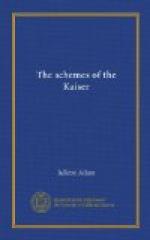But William II continues to evoke the red vision of France militant, in order to obtain the vote for his military credits. It would seem that his liberalism has gone to join his socialism. At the dinner of the Brandenburgers he said “God inspires me; the people and the nation owe me their obedience.” No matter whether he bungles or blunders, God alone is responsible, and it is not for the people or the nation to argue. And what is more, has not the new President of the Evangelical Church just proclaimed William II as summus episcopus? Just as William claims to decide infallibly every political question he will now decide all theological questions, without asking any help from the supreme council of the Evangelical Church.
Pope, Emperor and King—but does anybody suppose that this will satisfy him?
March 27, 1891. [6]
The reception of the delegates from Alsace-Lorraine at Berlin is characteristic. William II, eternally pre-occupied with stage-effects, has on this occasion accentuated the disproportion between the framework and the results obtained. He insisted upon it that the proceedings should be as imposing as the refusal of the delegates’ request was to be humiliating. All the pomp and circumstance of State was displayed for the occasion, with the result of producing a scene, carefully prepared in advance, worthy of a Nero. The Emperor of Germany surrounded by his military household, in the hall of his Knights of the Guard, receives the complaints of the representatives of Alsace-Lorraine, who have come to ask for a relaxation of the laws imposed on them by conquest. To them, William II made answer: “The sooner the population of Alsace-Lorraine becomes convinced that the ties which bind her to the German Empire will never be broken, the sooner she proves more definitely that she is resolved henceforward to display unswerving fidelity towards me and towards the Empire, the sooner will this hope of hers be realised.”
Above the Imperial Palace, during this scene, the yellow flag of the Emperors of Germany floated side by side with the purple banner of Prussia.
Another picture—
The Emperor gives a banquet to the delegates of Alsace-Lorraine, after having refused to hear their complaints. At the same table with them he invites Herr Krupp to sit, in order to remind the people of the annexed provinces of the cannons which defeated France and will defeat her again. Here we have a reproduction of the Roman Empire in decay. The power of the conqueror, imposed in all its pomp upon the vanquished, with the cruelty of a bygone age.
The all-absorbing personality of William grows more and more jealous. He would like to fill the whole stage of the theatre of the empire and of the world itself. More than that, he even demands that the past should date from himself, and he turns history inside out, having it written to begin with his reign, and reascending the course of time. First himself, then the house of Hohenzollern, then Prussia, and let that suffice. The other dynasties, other kingdoms of Germany, count for so little that it is sufficient merely to mention their existence. The history of which I speak, written for the German Army, will be prescribed later on for use of the high schools.




